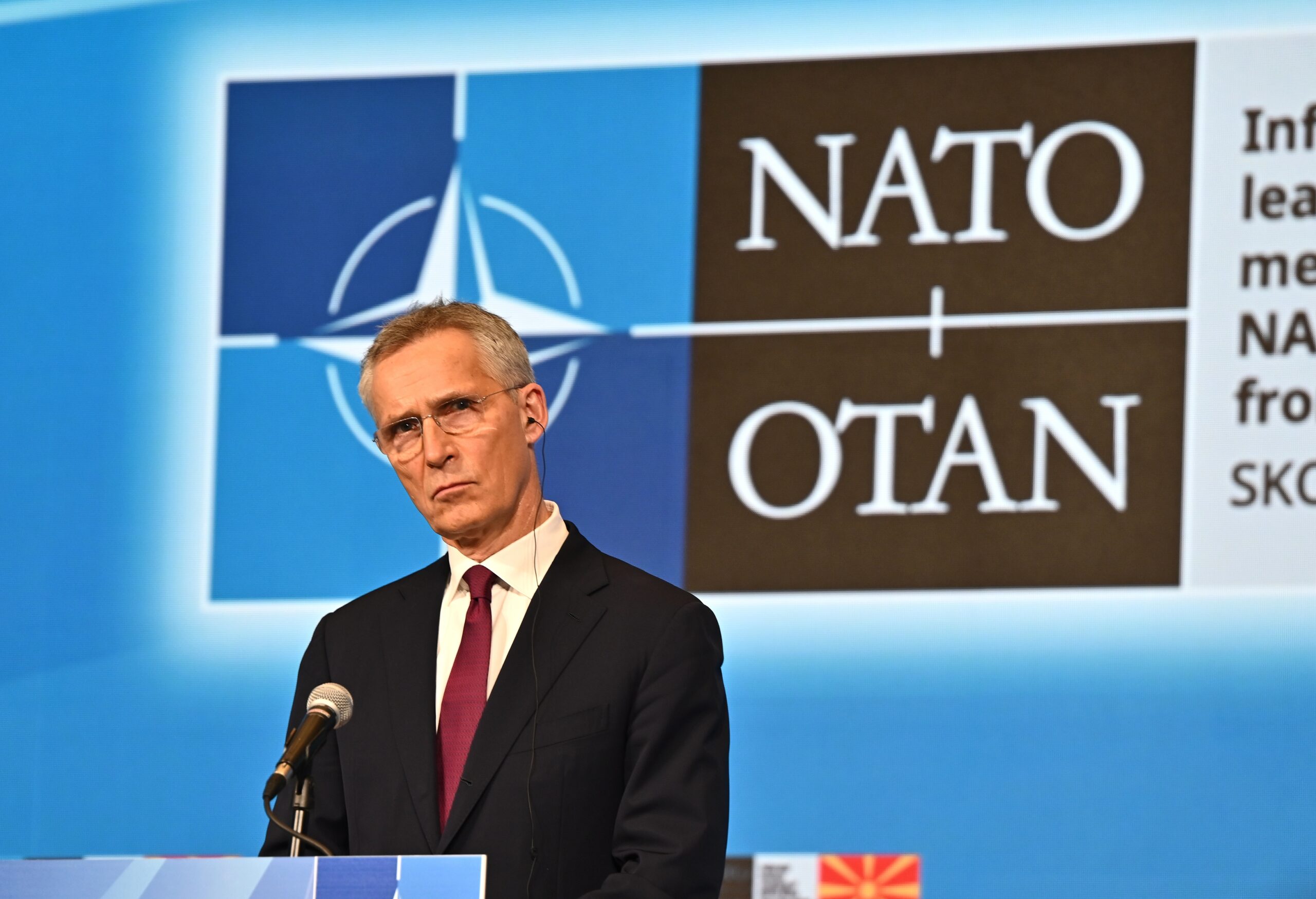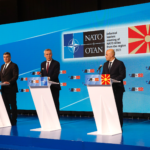Russia may provoke a new war in the Western Balkans, Ukrainian President Volodymyr Zelensky recently said. That’s if the West retains a wait-and-see position. The warning voiced by Zelensky was supplemented by the President of Serbia, Aleksandar Vucic, who later claimed that he’s afraid the year 2024 “will bring us much more conflicts and disturbances than the previous one. We are talking about all kinds of threats in Republika Srpska, Kosovo, and other parts of the region.”
Thus, the West has recently deepened its attention to the region, including to its security and stability. This is evidenced by the urgent visit of NATO Secretary General Jens Stoltenberg to the most vulnerable countries of the Western Balkans region: Bosnia and Herzegovina, Kosovo, Serbia, and North Macedonia. But Russia is not giving up on its attempts to once again pit the populations of the Balkan home against each other.
Is the Western Balkans really facing a new war? The question is ambiguous. However, the answer is, too. One thing can be stated for sure – since the outset of Russian aggression against Ukraine, the threat of a military conflict in the Balkans has increased significantly. In our opinion, there are several factors that can provoke an armed conflict.
The first factor is Russia, which employs a range of media resources, including Russia Today and Sputnik, and a number of print and online publications. Other Moscow tools of influence include Russophilism, falsified history and modern relations with the Balkan countries, provoking and supporting corruption in the region, financing pro-Russian politicians and organizations, including a few paramilitary formations. The so-called Russian Humanitarian Center in the city of Nis (Serbia) sometimes engages not only in humanitarian, but also in intelligence and media activities.
Russia is trying its best to shift the public focus from its aggression in Ukraine, destabilizing the region, amplifying a variety of existing contradictions and problems in the field of history, languages, and borders, fueling inter-confessional and international confrontation. The Kremlin’s interest is clear – the creation of a long-term system of destabilization of the Western Balkans as a prerequisite for a possible war, as well as stopping the process of the region’s European integration.
The second one is the “Dodik factor”. In our opinion, the current president of Republika Srpska has turned from simply an influential politician into the “Dodik factor.” For years, he has systematically sought to split Bosnia and Herzegovina, trying to remove RS from its structure. Dodik became one of the Russian tools for destabilizing not only BiH, but also the entire Western Balkans, as well as a reliable and permanent channel of Russian influence and penetration into the region. He went from verbal threats to split BiH to real steps that violate the Dayton Peace Agreements and the BiH Constitution, and threaten the country’s integrity. Dodik also said that by 2030 he would become “the first president of the independent RS.” Is this not a pretext for armed confrontation? After all, we cannot forget the harsh statements of Bosniak politicians that there will be no peaceful division of Bosnia and Herzegovina.
The third factor is the unsettled relations between Kosovo and Serbia. The delay by the leaders of the two states in the implementation of previously reached agreements and the violation of the assumed obligations highten the risk of an armed conflict. The Serbian and Russian military have developed appropriate plans for such a contingency, and the Serbian army has repeatedly deployed on the borders with Kosovo. In September, Serbian terrorists broke into the village of Banjska in Kosovo, and the first shots were fired. The conflict was contained, but it was just a test of resilience. And it is unlikely that Kosovars will “forget” that a local policeman was shot in the line of duty. Such things are never forgiven or forgotten in the Balkans. The fact that the Serbian paramilitary group was not afraid of the international KFOR forces, which are called to ensure stability in Kosovo and prevent such provocations, is also worth noting.
The fourth factor is the arms race in the Western Balkans. After the last war, thousands of firearms and other weapons remained in the region. Locals say every driver has either a handgun or an assault rifle under their car seat. The Western Balkans faced a new challenge after Russia unleashed aggression against Ukraine. The existing Subregional Arms Control Agreement was forgotten, its caps were discarded, and an arms race began. Its leaders have already been determined – it’s Serbia and Croatia. For example, in 2022, Serbia spent more than EUR 460 million on the purchase of weapons alone, while the 2023 military budget was increased to EUR 1.4 billion (EUR 162.1 of military expenses per capita). Croatia almost doubled its military budget to EUR 1.1 billion (EUR 270 per capita). It also grew by more than 10% in BiH, amounting to EUR 153 million (EUR 46.7 per capita). Each inhabitant of Kosovo contributes an average of EUR 61 to the country’s military budget of EUR 108 million, North Macedonia – EUR 107.5 (EUR 225 million), and Montenegro – EUR 155.5 (EUR 98 million). At the same time, Russia is rapidly losing its traditional ex-Yugoslavia arms market, which is confidently seized by EU member states, China, and Turkey. And Serbia has turned into a systemic actor in this specific market as an arms seller.
The technical base of the war has been prepared quite well, and the arms stocks of the countries in the regions are expanding. This is very dangerous trend for a region where for centuries, problems tended to be solved through force…
There is another opinion – an armed conflict in the Western Balkans is impossible. Its backers agree: indeed, peace in the region is quite fragile. Indeed, there are many contradictions between countries. But there are no forces capable of waging a new war, believes a member of the BiH Presidium, Zeljko Komsic. It is politically harmful to claim that war is already on the region’s doorstep, many analysts in the Western Balkans say. They try to explain their position with the following arguments.
The first argument is the NATO factor. The region is surrounded by the member states, and four of the seven countries of the Western Balkans are NATO allies. And two non-members – Bosnia and Herzegovina and Kosovo – are home to NATO bases and European Union forces (EUFOR), which are expected to guarantee peace and stability in the region. All this means that there is almost no room left for the Russian presence. But the latest events in the north of Kosovo, the passive reaction to Dodik’s actions cast doubt on the ability of EU and NATO forces in the region to respond quickly to the unfolding crises. Perhaps that is why Jens Stoltenberg, during his latest tour of the Western Balkans, said the Alliance would consider increasing the presence of its military contingent here by almost threefold.
The second argument is the absence of an external factor, without which war is unlikely. This is a dubious argument. With the outset of aggression against Ukraine, Russia really lost multiple opportunities to provide military and financial assistance to its friends in the region, and logistics became more complicated. But there are other external forces. Turkey and the Gulf monarchies are helping Kosovo and the Bosniaks of BiH strengthen their armed forces. Viktor Orban stands categorically against EU sanctions targeting Dodik, which in turn supports his separatism and threatens the integrity of BiH. Zoran Milanovic, the President of Croatia, has repeatedly reacted positively to the policy of the RS president, and such a position does not at all contribute to the stabilization in the region.
The third argument is that the economic dependence of the Western Balkans nations on Western aid is incredibly high. The European Union and the USA are their main economic partners and financial donors, without which those economies may find themselves in crisis. Global economy, in the conditions of modern-day instability, does not need another war, even more so in the center of Europe. Also, China, which is confidently expanding its economic presence in the region, has no interest in losing this market as a convenient gate to Western and Central Europe.
As we can see, there is no unequivocal answer to the question of whether another war could be unleashed in the Western Balkans. But fear of this war roams the streets of many cities across Bosnia and Herzegovina, Kosovo, and Serbia. This fear can actually prevent an explosion, becoming a sort of a deterrent. But if it is accompanied by various reminders of the past – victims, loss of loved ones, and enmity toward the other party, then it can lead to a new fire. One thing is clear. Ukraine’s resistance to Russian aggression is the tool that today helps keep the region away from a new war and prevents the fragile peace in the Western Balkans from being destroyed.



